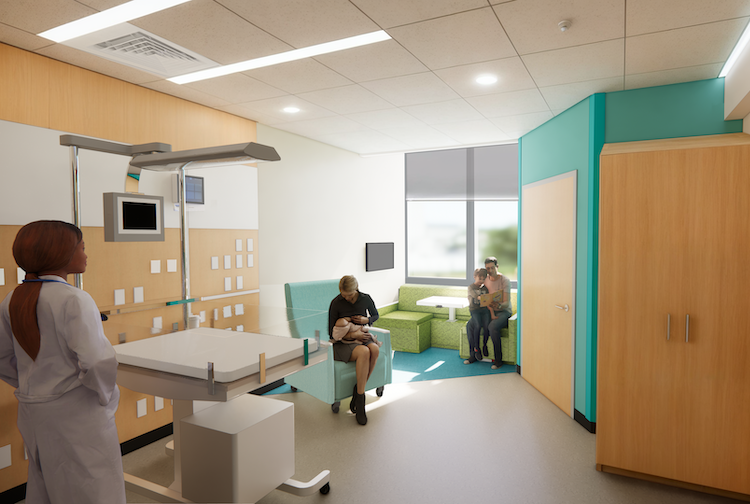Having a hand in science: Families join VCU project to study long COVID in children
More than 200 families are participating in a VCU School of Nursing research project as part of a nationwide study to better understand the long-term health impacts of COVID-19 on our youngest populations.
August 09, 2023 RECOVER project participant Rylee Joyce prepares to have her blood drawn for lab tests by Laura Stevens, RN, clinical research nurse coordinator. (VCU Enterprise Marketing and Communications)
RECOVER project participant Rylee Joyce prepares to have her blood drawn for lab tests by Laura Stevens, RN, clinical research nurse coordinator. (VCU Enterprise Marketing and Communications)
By Olivia Trani
Life has always been in motion for Rylee Joyce. From classical ballet, jazz, tap, modern, hip hop and theatre, the 16-year-old rarely kept still. When she wasn't practicing for the stage, Rylee was focused on the skies. Through her local Civil Air Patrol program in Rockingham County, North Carolina, she was learning how to fly planes in the hopes of becoming a pilot in the U.S. Air Force.
“Now, something as simple as going up the stairs to my room will leave me out of breath,” she said.
In December 2020, Rylee caught COVID-19. Though she experienced a number of strong symptoms, such as smell loss, coughing, fatigue and nausea, she recovered after a few weeks. Rylee was re-infected with COVID-19 in January 2022, but this time she underwent a wider range of health issues, many of which she still lives with today.
“By the time it was February, that's when I knew something wasn't right at all,” said Dee Joyce, Rylee's mother.
For the past year and a half, Rylee has been impacted by several long-lasting symptoms of COVID-19, including intense exhaustion, nausea, migraines, brain fog, temporary hearing loss, as well as numbness and tingling sensations. Many days leave her so tired that she relies on a wheeled walker to get around.
“At the beginning, Rylee would sleep all the time, which was really, really odd because she never slept in. She was always the child who was afraid of missing out on something,” Dee said. “There was a period when Rylee was only awake for two hours a day.”
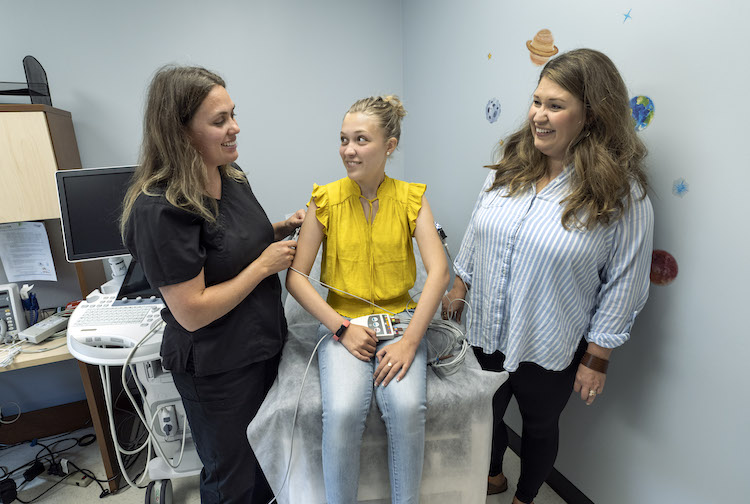
Dee Joyce says her daughter, Rylee, has been experiencing long-lasting symptoms from COVID-19 for more than a year. Rylee is now one of more than 200 kids, teens and young adults around Virginia to have enrolled in the RECOVER project. Pictured left to right: Laura Stevens, RN, clinical research nurse coordinator, Rylee Joyce and Dee Joyce. (VCU Enterprise Marketing and Communications)
After a number of health care visits, Rylee was formally diagnosed with long COVID, a condition where symptoms from COVID-19 end up lingering for weeks, months, or even years. Like many others with long COVID, Rylee was also diagnosed with dysautonomia, a disorder of the autonomic nervous system which controls the body's involuntary functions, such as breathing and heartbeats.
“When I do meet another person with long COVID, I'll compare symptoms with them and they're like, 'Oh, well, I got this.' I'm like, 'Oh, I got this.' So even when I connect with people with long COVID, our experiences are still different,” Rylee said.
Much of what is known about long COVID is based on studies in adults, but less understood are the effects in children and adolescents like Rylee. A team of clinical researchers at Virginia Commonwealth University's School of Nursing is leading a research consortium to learn how long COVID impacts younger populations, including infants, children, teenagers and young adults.
Rylee is now one of more than 200 kids and adolescents around Virginia to have enrolled in the project.
“It's been a long journey to get to where we are now. When Rylee first started experiencing health issues, I felt like I had to really fight for her. When we spoke with health care providers, we were told that there wasn't enough data about long COVID but that the symptoms would likely eventually go away,” Dee said. “It's now been almost two years, and I've kept daily logs of all the things Rylee has been going through. I had tons of data and didn't know what to do with it. That's when a friend of mine based in Richmond introduced me to the RECOVER project.”
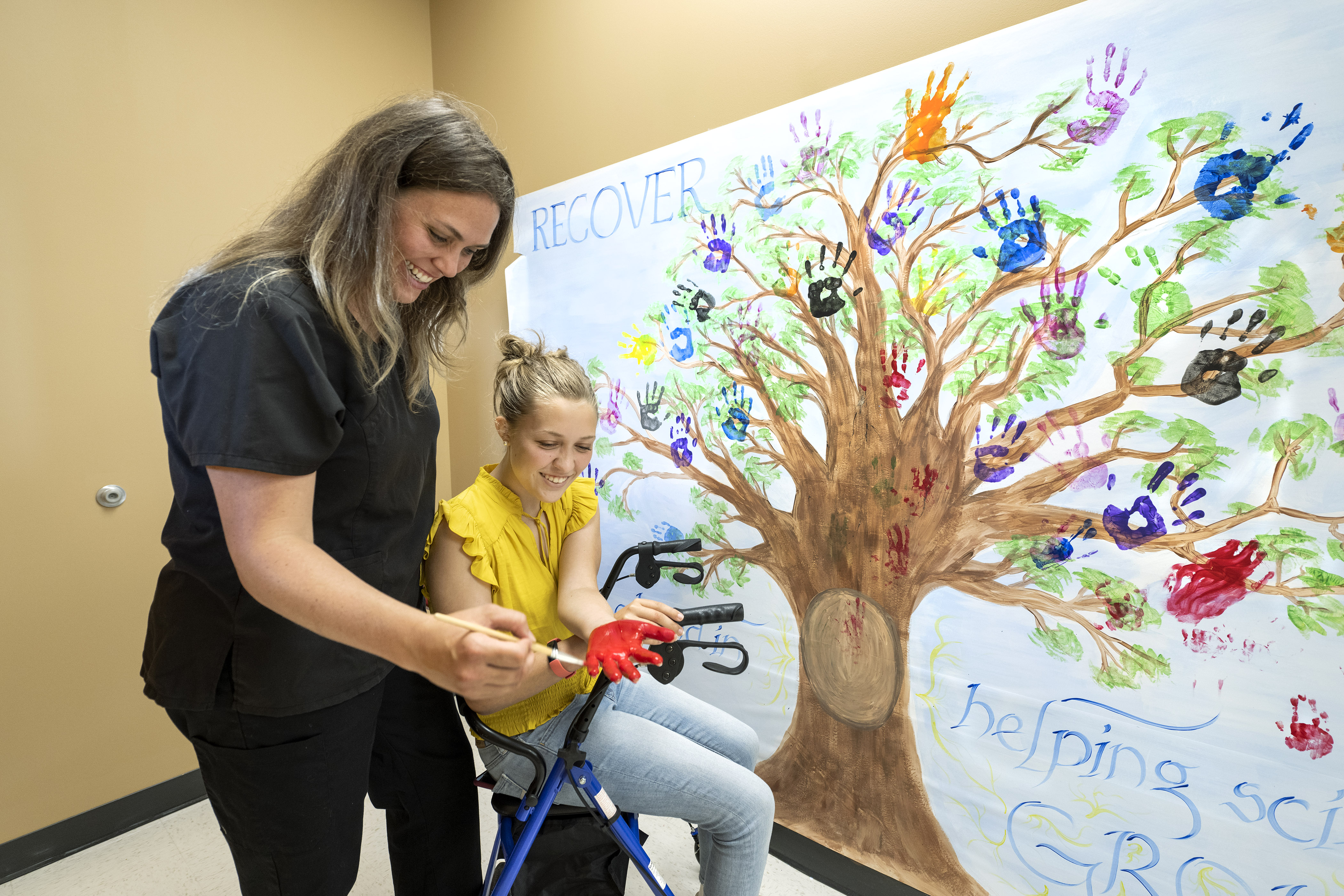
Rylee Joyce adds her handprint to a mural in the VCU School of Nursing building, which features a tree full of handprints of all the project participants to show that they “had a hand” in science. (VCU Enterprise Marketing and Communications)
Research with recovery in mind
The VCU-led research consortium is part of the Researching COVID to Enhance Recovery (RECOVER) initiative, a nationwide study funded by the National Institutes of Health to better understand the long-term health impacts of COVID-19. The data collected through VCU and other participating institutions will help researchers and clinicians better understand long COVID through a pediatric perspective, with the goal of developing effective treatments.
As part of the project, the research team surveys each volunteer about their health and well-being, as well as collect biological samples, such as saliva and a tiny bit of blood. A subset of volunteers will then participate in clinical assessments over the next several years to track their health, including their lungs, heart and neurodevelopment.
Over the past year, the research team has attended several public events throughout the greater Richmond area to raise awareness of the project and provide information to families interested in getting involved.
“At these events we do STEM activities with kids to teach them about antibodies and blood cells. We have also connected with community partners in Richmond and rural regions of central Virginia to raise awareness of this project,” said Lindsey Stevenson, RN, one of the clinical research nurse coordinators involved in this project.
“We've been pretty fortunate to connect with several people with long COVID symptoms, which we knew would be difficult because the condition is not something that's widely being diagnosed. We've had participants come in from North Carolina to Northern Virginia to be a part of the study,” said Laura Stevens, RN, another clinical research nurse coordinator for the project.
In addition to enrolling children and young adults who have been diagnosed with long COVID, the researchers are recruiting families who suspect their kid might have long-lasting symptoms of COVID.
“If a child is experiencing an unexplained change in their behavior, mood or energy level, it could be related to COVID, but it's not been linked to the actual infection,” said Amy Salisbury, Ph.D., professor and associate dean for research, scholarship and innovation at the VCU School of Nursing, who serves as one of the principal investigators of the RECOVER initiative. “That's what happened with chronic fatigue and other post-viral syndromes for decades, but now there is a lot of evidence that chronic fatigue and other long-lasting conditions can be triggered by viral infections.”
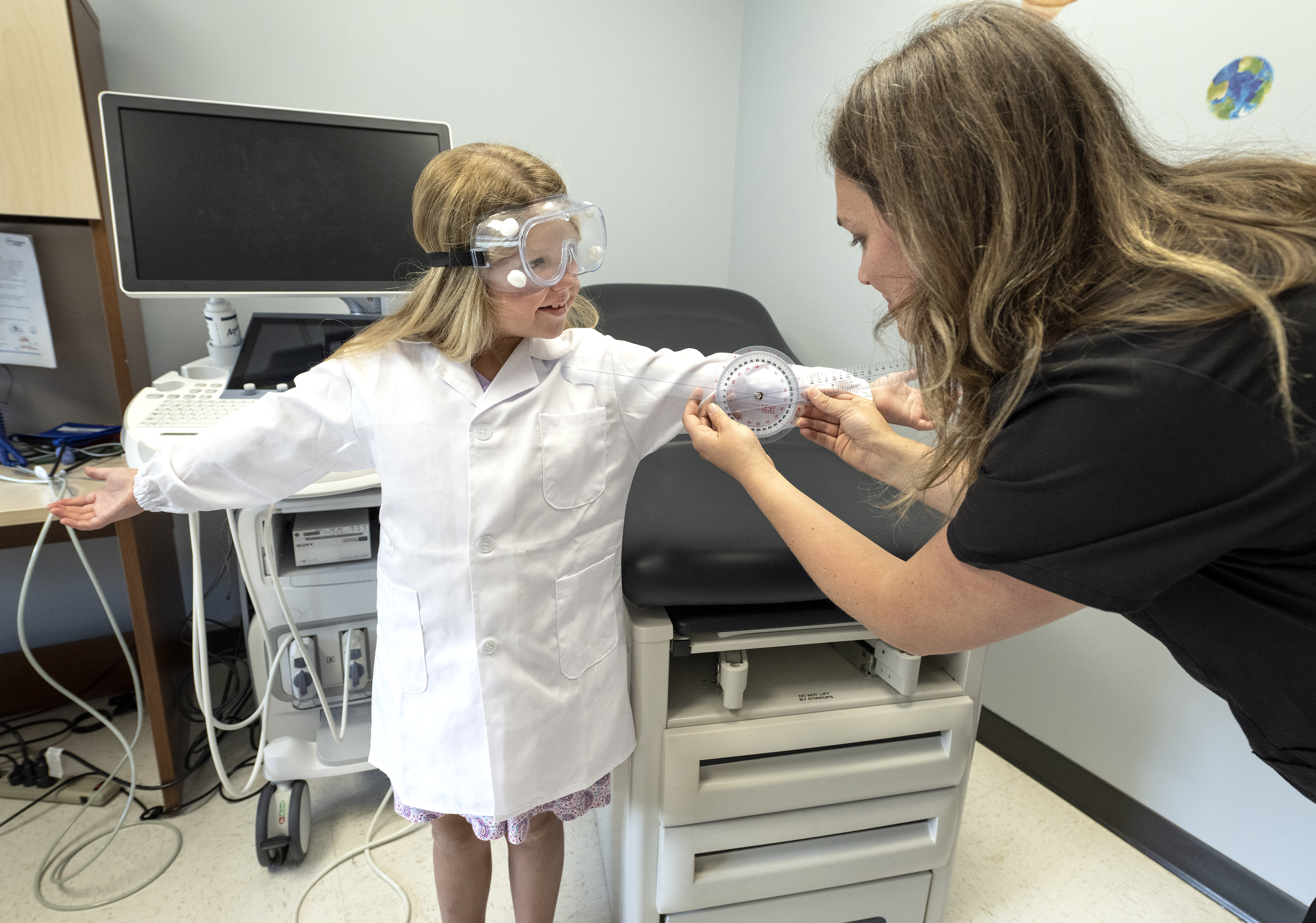
Cora O'Dell-Rodgers dreams of going to VCU and becoming a doctor when she is older. The VCU School of Nursing research team wanted to make the RECOVER project accessible to the children they are working with, treating them like “little scientists” on the project. (VCU Enterprise Marketing and Communications)
A citizen science approach
Another important part of this study is enrolling families with children who haven't experienced lingering symptoms from COVID-19 or were never infected in the first place.
This is the case for Bekah O'Dell and her 8-year-old daughter, Cora. Bekah found out about the study through Stevens, who lives in their neighborhood in Chesterfield. While Cora doesn't have long COVID, they were excited to play an active role in a local research project.
“Laura [Stevens] knew that Cora was interested in science and has always wanted to visit the hospital,” Bekah said. “This was a great opportunity to not only give Cora a chance to learn more about how researchers study diseases and sickness, but she's also a part of a larger effort to help people understand how COVID-19 affects kids.”
“I want to be a doctor when I grow up and I want to go to VCU, so that's really what got me into the project. I just want to help people and learn about the body,” Cora added. “It was really neat to explore all of these things and see how it all works. I would encourage any kid to try it out because it's just an amazing experience.”
Cora says one of her favorite parts of the experience was to add her handprint to a mural in the School of Nursing building. The painting shows a tree full of handprints of all the project participants to show that they “had a hand” in science. During her visit, Cora also got to meet several members of the research team and try on a lab coat and goggles.
“We've really tried taking a citizen scientist approach to this project. The kids we work with are essentially little scientists in this project, and we want them to be involved as much as possible,” said Patricia Kinser, Ph.D., endowed professor and assistant dean for research at the VCU School of Nursing, and co-leader of the VCU research site with Salisbury.
“When we talk to the participating kids about our research, they get super excited by the fact that their blood samples and the other assessments they're doing are going to help us learn more about long COVID and help kids affected by this condition,” Stevenson added.
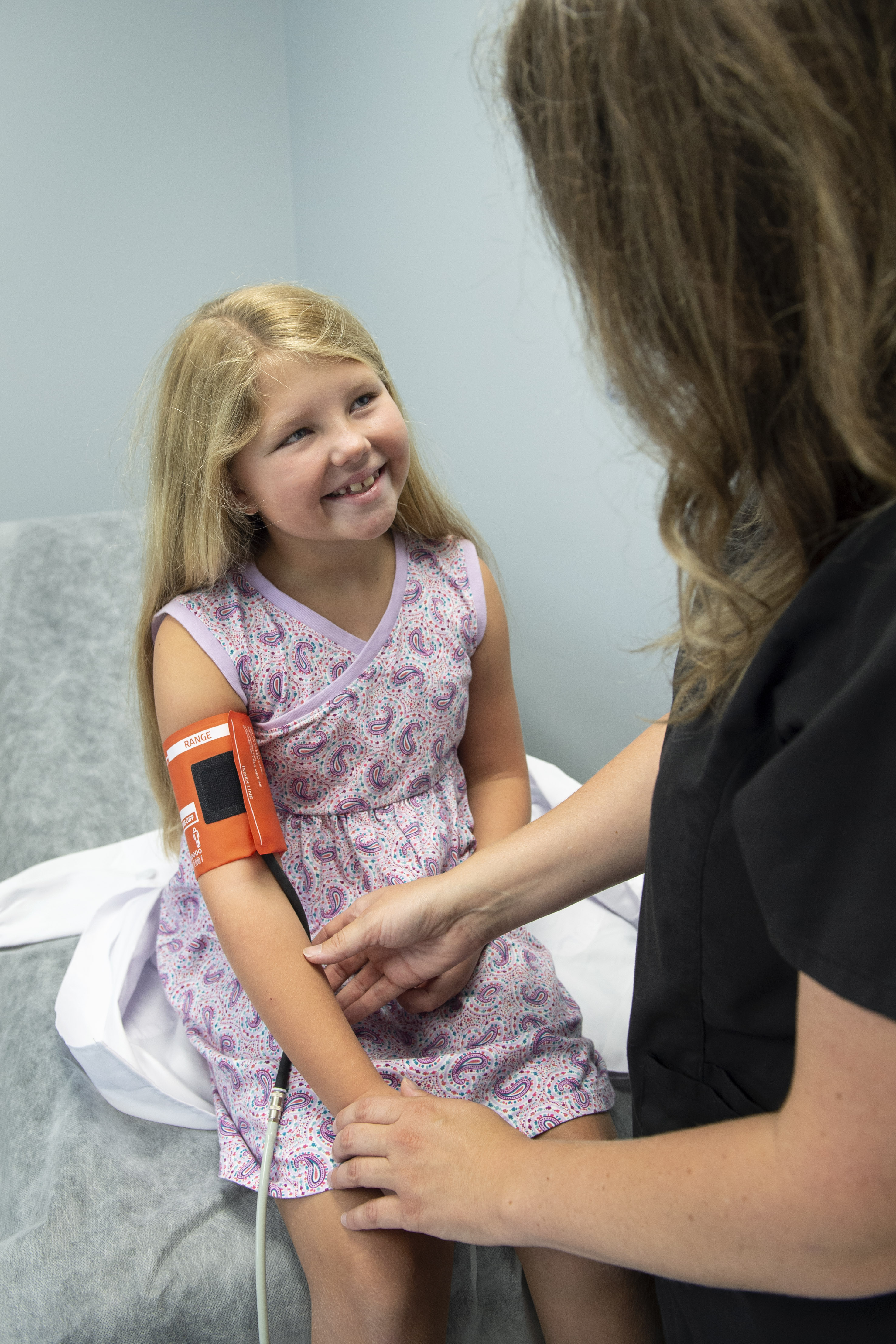
While Cora O'Dell-Rodgers doesn't have long COVID, she was able to participate in the RECOVER project as a citizen scientist and learned how clinical researchers conduct studies. (VCU Enterprise Marketing and Communications)
Feeling seen and heard
The research team noted that many of the participating families who are having to navigate long COVID feel their concerns are validated and acknowledged by the fact that this study exists.
“They are eager to find a community where they can talk to others experiencing similar symptoms,” said Jocelyn Espinoza, a research coordinator for the project.“Knowing that we are in their corner and trying to better understand this condition makes many of our participants feel seen and heard about what they are experiencing.”
“I don't think there's enough recognition of the devastation that long COVID has caused, especially on young adults and teenagers,” Stevens said. “Even though the pandemic is no longer a public health emergency, there are still people who are suffering from this disease and lacking resources. We're hopeful that through this study, we'll be able to get some answers.”
Families in Virginia who are interested in participating can learn more at bit.ly/RECOVERkids. The research team will be enrolling families with children, adolescents or young adults age 25 or younger until December 2023.











